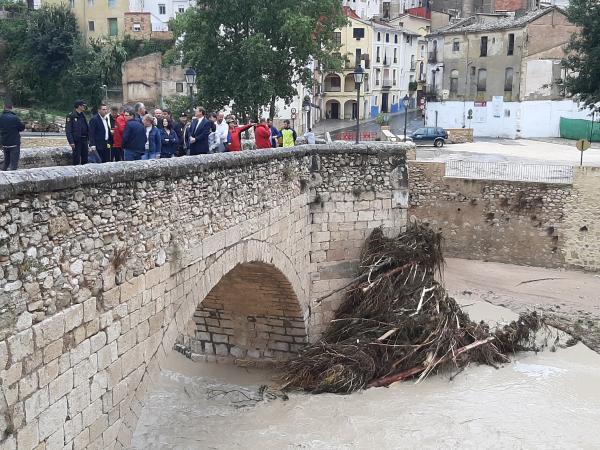
- The agreement will aid the repair of damaged infrastructure and promote preventive measures to improve the region’s climate resilience.
- The investments will help create an estimated 1 500 jobs during the implementation phase.
The European Investment Bank (EIB) will provide €100 million to the Valencia Region for the reconstruction of infrastructure damaged in late 2019 by extreme weather caused by a phenomenon described as “isolated high altitude depression” – or a “DANA” as it is known in Spain – and by Storm Gloria in early 2020. The objective is to get industry and tourism in the affected areas up and running again and to restore basic services infrastructure. The financing will also be used to mitigate the effects of any similar weather events that may occur before the end of 2021. Divided into two tranches of €50 million each, the loan will also help improve the region’s climate resilience, promoting investments in flood prevention and a better response to future adverse weather events.
In September and October 2019, two “DANA” events led to the worst storms to hit Spain’s Mediterranean coast in 140 years. These were followed by Storm Gloria in January 2020, which produced winds of 115 km/h and the highest rainfall on record. Such weather events are common in the area. In this case, they led to record levels of rainfall in a short amount of time, causing severe flooding and extensive damage, mainly in the provinces of Alicante and Valencia.
The EIB and the Government of Valencia signed the first €50 million tranche of this financing on Tuesday. The funds will mainly be used to rebuild water supply, sanitation, water treatment and drainage infrastructure, as well as irrigation and drainage channels. They will also finance projects to rebuild roads, tourism and coastal infrastructure and public buildings, including healthcare facilities, hospitals and schools.
A second tranche of this financing is expected to be signed for the same amount. This will mainly be used to finance prevention and response measures for dealing with similar weather events in the future. These include the construction of green corridors, pumping systems and polders; environmental projects and culvert improvements; and public safety measures, i.e. the introduction of warning systems. These measures are currently being studied as part of the general flood defence plan for the Vega Baja del Río Segura.
The total investment will help create more than an estimated 1 500 jobs during the implementation phase between 2019 and 2025.
EIB Vice-President Emma Navarro, who is responsible for the Bank’s operations in Spain, said: “As the EU climate bank, one of our main objectives is to promote climate change mitigation and adaptation projects. We are therefore delighted to be supporting the Valencia Region with the reconstruction of infrastructure damaged by the ‘DANA’ weather phenomenon and by Storm Gloria, and to improve its preparedness and response capacity for similar events. In addition to strengthening the region’s climate resilience, this agreement will facilitate investments in key infrastructure to boost economic recovery and job creation – another EIB priority objective in Spain.”
Minister of Finance and Economic Model for the Valencia Region Vicent Soler said: “This operation with the EIB will enable us to finance measures that the Government of Valencia implemented immediately after the extreme weather seen in 2019, and to make structural investments to prevent the impacts of future climate events. Experts have described the Mediterranean as the ground zero of climate change. The Valencia Region will see an increase in droughts and periods of torrential rain, as well as higher temperatures and rising sea levels. Investments in greater climate resilience will therefore be a priority in the coming years, in line with the recovery plan.”
The EU climate bank
The EIB is the world’s largest multilateral provider of climate finance. Its goal is to be a leader in mobilising the finance needed to limit the average global temperature increase to 1.5°C compared to pre-industrial levels in order to meet the Paris Agreement objectives. On 14 November 2019, the EIB Board of Directors approved its new climate objectives and the new energy lending policy. The Bank will gradually increase its financing for climate and environmental objectives up to 50% by 2025, with the goal of ensuring that the EIB Group mobilises at least €1 trillion in the critical decade between 2021 and 2030 to promote investments helping to meet these objectives. It also announced its intention to align all EIB Group activities with the Paris Agreement. To this end, the EIB will cease financing fossil fuel-based projects from late 2021.
The EIB is the world’s largest issuer of green bonds and was the first organisation to make an issue on this market in 2007.